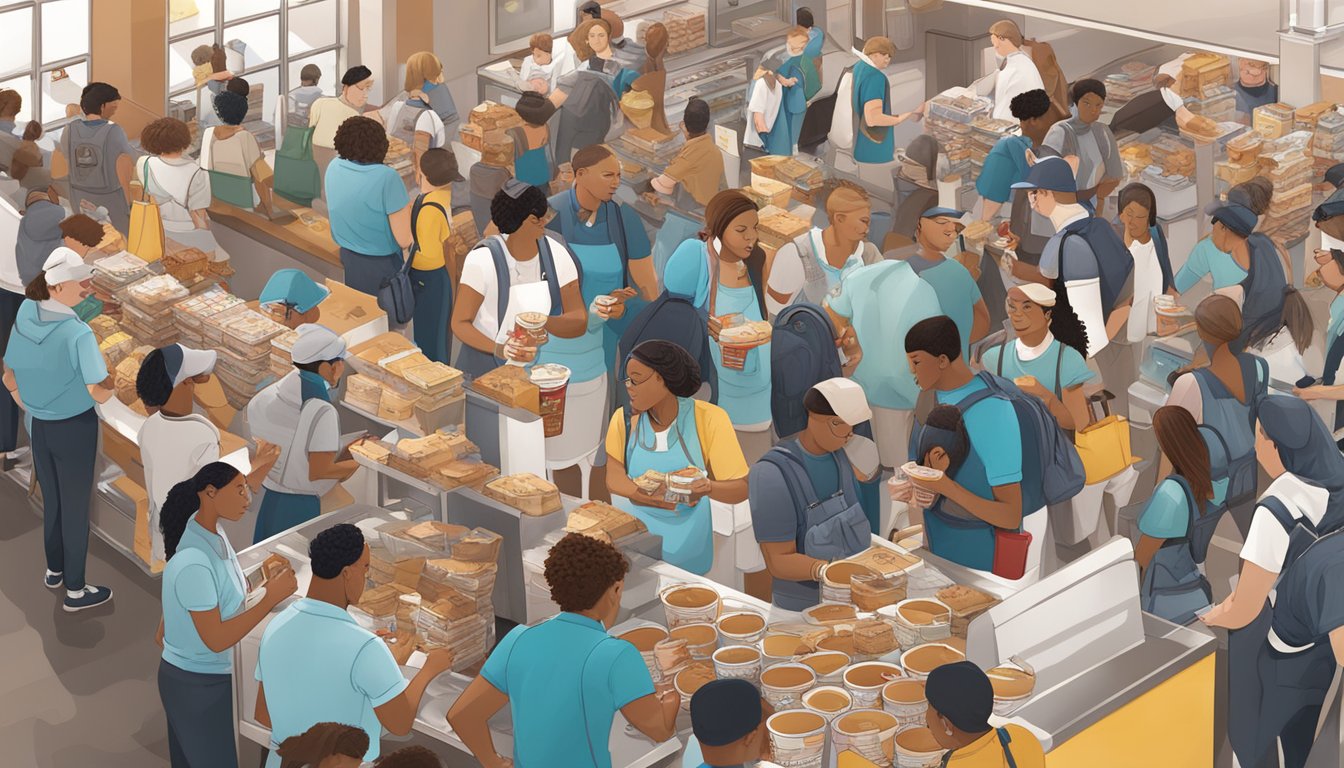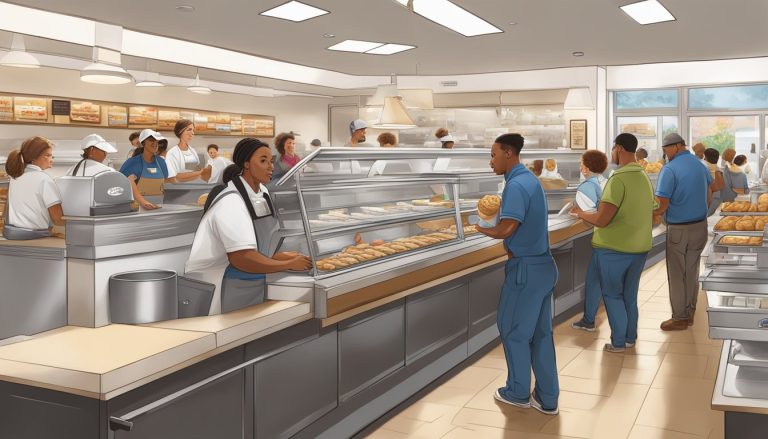Chick-fil-A has taken significant steps to reduce the environmental impact of its packaging, including for breakfast items. The fast-food chain has implemented various initiatives to make its containers and utensils more sustainable.
Chick-fil-A’s breakfast packaging now incorporates post-consumer recycled materials and commercially compostable options, demonstrating the company’s commitment to environmental responsibility. This shift includes using recycled plastic bottles in employee uniforms and exploring alternatives to traditional single-use items.
The company’s efforts extend beyond packaging to food waste reduction. Chick-fil-A has implemented a food donation program and composting initiatives at many locations, diverting millions of pounds of waste from landfills. These actions showcase Chick-fil-A’s holistic approach to minimizing its ecological footprint across all aspects of its operations.
Overview of Chick-fil-A’s Environmental Commitment

Chick-fil-A has made significant strides in its environmental and social responsibility efforts. The company focuses on caring for people, communities, and the planet through various initiatives and programs.
Corporate Social Responsibility at Chick-fil-A
Chick-fil-A’s corporate social responsibility (CSR) strategy centers on four key areas: Caring for People, Caring for Communities, Caring for Others through Food, and Caring for the Planet. The company has implemented sustainable practices in its operations, including the use of post-consumer recycled plastic in Team Member uniforms. Each red polo shirt contains material from 19 recycled plastic bottles, while blue shirts incorporate nine.
Chick-fil-A also supports its employees through the Chick-fil-A Together Fund, which provides financial assistance during times of need. This demonstrates the company’s commitment to caring for its workforce beyond just environmental initiatives.
Chick-fil-A’s Global Impact Report Highlights
Chick-fil-A releases annual Global Impact Reports to showcase its CSR progress. The 2023 report, published on May 15, 2024, details the company’s efforts to serve and strengthen local communities. It outlines advancements in the four focus areas of their CSR strategy.
Key initiatives highlighted in the report include:
- Scholarship programs for employees
- Local impact awards
- Donations to humanitarian causes
- $1 million contribution to aid efforts in Ukraine
These reports serve as a transparent record of Chick-fil-A’s ongoing commitment to social and environmental responsibility.
Food Donation and Sharing Initiatives
The Chick-fil-A Shared Table program is a cornerstone of the company’s efforts to reduce food waste and support local communities. This initiative allows Chick-fil-A restaurants to donate surplus food to local shelters, soup kitchens, and charities.
By redirecting excess food to those in need, Chick-fil-A simultaneously addresses food insecurity and minimizes environmental impact. The program aligns with the company’s goal of caring for others through food, demonstrating how businesses can create positive change through thoughtful resource management.
Chick-fil-A also encourages its franchise operators to engage in local food donation efforts, further extending the reach of its community support initiatives.
Packaging and Material Usage
Chick-fil-A has implemented several initiatives to address the environmental impact of its packaging. The company focuses on sustainability in food containers, transitioning to eco-friendly materials, and finding alternatives to foam cups.
Sustainability in Food Packaging
Chick-fil-A prioritizes sustainability in its food packaging choices. The company uses post-consumer recycled plastic in many areas, including Team Member uniforms. Each red polo shirt contains material from 19 recycled plastic bottles, while blue shirts incorporate nine. This practice extends to food containers as well.
Chick-fil-A collaborates with suppliers to develop more sustainable packaging solutions. The company is a co-founding member of the Poly Coated Paper Alliance, which aims to improve recycling infrastructure for food packaging materials. This partnership demonstrates Chick-fil-A’s commitment to reducing its environmental footprint.
Transition to Eco-Friendly Materials
Chick-fil-A is actively working to eliminate intentionally added PFAS from all newly produced packaging. PFAS, or per- and polyfluoroalkyl substances, are chemicals commonly used in food packaging for their oil and grease-resistant properties. The company planned to phase out products containing PFAS by the end of summer 2022.
This transition aligns with Chick-fil-A’s broader sustainability goals. The company is exploring alternative materials that offer similar functionality without the environmental concerns associated with PFAS. This shift reflects a growing trend in the food industry towards more eco-friendly packaging options.
Foam Cups and Alternatives
Foam cups have long been a concern for environmentally conscious consumers due to their non-biodegradable nature. Chick-fil-A has recognized this issue and is exploring alternatives to foam cups in its beverage service.
The company is testing various materials that offer similar insulation properties while being more environmentally friendly. Options may include recyclable plastic cups, compostable materials, or reusable cup programs. Chick-fil-A’s approach to foam cup alternatives demonstrates its commitment to balancing customer experience with environmental responsibility.
Waste Management and Reduction Strategies
Chick-fil-A implements comprehensive waste management strategies to minimize its environmental footprint. These efforts focus on reducing food waste, implementing composting and recycling programs, and collaborating with local communities.
Food Waste Handling in Restaurants
Chick-fil-A has set an ambitious goal to divert 25 million pounds of restaurant food waste from landfills by 2025. The company employs various techniques to achieve this target. One key initiative is the Shared Table program, which allows restaurants to donate surplus food to local organizations.
Nearly 2,000 Chick-fil-A locations participate in this program, helping to reduce food waste while supporting community needs. The company also uses data analytics to optimize food preparation and reduce overproduction.
Composting and Recycling Programs
Chick-fil-A has implemented composting programs at its U.S. Support Center locations. This initiative helps convert food waste into nutrient-rich soil amendments. The company also uses commercially compostable packaging for many of its food items, further reducing its environmental impact.
In addition to composting, Chick-fil-A has partnered with Darling Ingredients to recycle used cooking oil from over 1,000 restaurants. This oil is converted into renewable diesel fuel, which can reduce greenhouse gas emissions by up to 85%.
Collaboration with Communities for Waste Reduction
Chick-fil-A recognizes the importance of community involvement in waste reduction efforts. The company has joined the U.S. Food Waste Pact, demonstrating its commitment to accelerating food waste reduction on a national scale.
Local Chick-fil-A restaurants often partner with community organizations to implement waste reduction strategies. These collaborations may include participating in local recycling initiatives, organizing clean-up events, and educating customers about proper waste disposal.
The company also encourages its customers to adopt sustainable practices, such as using reusable items and minimizing packaging waste. By working together with communities, Chick-fil-A aims to create a more sustainable future.
Energy and Resource Conservation Efforts

Chick-fil-A has implemented several initiatives to reduce its environmental footprint and conserve resources. These efforts span renewable energy adoption, alternative fuel usage, and energy efficiency improvements across its operations.
Solar-Powered Microgrid Installations
Chick-fil-A has begun installing solar-powered microgrids at select restaurant locations. These systems combine solar panels, battery storage, and intelligent controls to generate and store clean energy on-site.
The microgrids can power restaurants during grid outages, enhancing resilience. They also reduce reliance on utility electricity during normal operations, lowering carbon emissions and energy costs.
Several pilot locations have reported significant reductions in grid electricity consumption after microgrid deployment. Chick-fil-A plans to expand the program to more restaurants in sunny regions.
Usage of Renewable Diesel and Energy
The company has started transitioning its delivery fleet to renewable diesel fuel in some markets. This alternative fuel is produced from vegetable oils and waste fats, generating lower lifecycle emissions compared to petroleum diesel.
Chick-fil-A has also increased its procurement of renewable energy through power purchase agreements. Some restaurants now receive a portion of their electricity from wind and solar farms.
These initiatives aim to decrease the carbon intensity of Chick-fil-A’s operations. The company has set targets to expand renewable fuel and energy usage across more locations in coming years.
Advancements in Energy Efficiency
Chick-fil-A has made strides in improving the energy efficiency of its restaurant equipment and buildings. New locations feature LED lighting, high-efficiency HVAC systems, and improved insulation.
The company has retrofitted many existing restaurants with smart energy management systems. These monitor and optimize electricity usage in real-time, reducing waste.
Chick-fil-A has also implemented more efficient cooking and refrigeration equipment. New fryers and coolers use less energy while maintaining food quality and safety standards.
Employee training programs on energy conservation practices have been rolled out across the chain. These efforts have yielded measurable reductions in per-restaurant energy consumption over the past several years.
Community Engagement and Social Impact
Chick-fil-A’s commitment to social responsibility extends beyond its restaurants. The company invests in local communities, supports education, and fosters leadership development through various initiatives.
Investment in Local Communities
Chick-fil-A actively supports the communities where its restaurants operate. The company’s True Inspiration Awards program grants millions of dollars annually to nonprofit organizations focused on education, hunger relief, and homelessness. In 2022, Chick-fil-A awarded $5 million to 34 organizations across the United States and Canada.
The Chick-fil-A Impact Accelerator, launched in 2021, provides a year-long program for nonprofits. This initiative offers mentorship, funding, and resources to help organizations scale their impact and address critical community needs.
Chick-fil-A restaurants also participate in local volunteer efforts and fundraising events. Many franchise operators collaborate with schools, churches, and community organizations to support local causes.
Educational Support and Scholarships
Education is a key focus of Chick-fil-A’s community engagement efforts. The company’s Remarkable Futures Scholarship program has awarded over $136 million in scholarships to more than 80,000 Team Members since 1973.
In 2022, Chick-fil-A awarded $24 million in scholarships to 12,699 Team Members. These scholarships support students pursuing higher education at accredited institutions across the United States and Canada.
The company also offers tuition discounts and other educational benefits to Team Members through partnerships with over 100 colleges and universities.
Chick-fil-A Leader Academy and Entrepreneurship
Chick-fil-A Leader Academy is a national high school leadership program that teaches students leadership skills and encourages community service. The program operates in over 1,000 high schools across the United States.
Students participate in monthly Leader Labs, focusing on topics such as teamwork, vision, and innovation. They also complete an Impact Project, addressing a specific need in their community.
The company’s commitment to entrepreneurship is evident in its franchise model. Chick-fil-A provides extensive training and support to its franchise operators, many of whom start as Team Members.
Through these initiatives, Chick-fil-A aims to foster leadership skills, promote economic mobility, and create positive change in local communities.
Innovations and Future Directions

Chick-fil-A continues to pioneer eco-friendly initiatives for its breakfast packaging. The company is exploring novel beverage options and planning events to engage customers in sustainability efforts.
Beverage Innovations and Sustainability
Chick-fil-A is introducing new drink options to reduce packaging waste. The sparkling blackberry mint lemonade comes in recyclable glass bottles, cutting down on single-use plastics.
Herbal infusions are now served in compostable cups made from plant-based materials. These cups break down completely within 12 weeks in industrial composting facilities.
The company is testing reusable cup programs at select locations. Customers can purchase a durable, branded cup and receive discounts on future beverage purchases when they bring it back.
Upcoming Events and Campaigns
Chick-fil-A restaurants are planning “Green Breakfast” events to showcase their sustainable packaging. Attendees will learn about eco-friendly materials and proper recycling techniques.
A social media campaign will encourage customers to share photos of their reusable containers. For each post, Chick-fil-A will plant a tree in partnership with environmental organizations.
The company is launching a design competition for college students to create innovative, sustainable breakfast packaging concepts. Winning designs may be implemented in future packaging updates.




